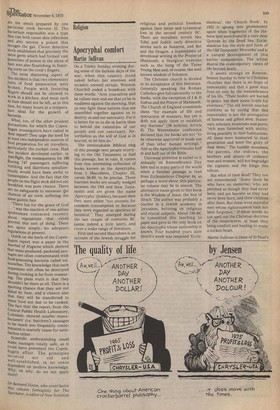Reli g ion
.Apocryphal comfort Martin Sullivan
On a Trinity Sunday evening during some of the darkest days of the war, when this country stood naked before her enemies and invasion seemed certain, Winston Churchill ended a broadcast with these words; "Arm yourselves and be valiant men and see that ye be in readiness against the morning, that ye may fight these nations that are assembled together against us to destroy us and our sanctuary. For it is better for us to die in battle than to behold the calamities of our people and our sanctuary. Nevertheless as the will of God is in heaven, so let him do."
The unmistakable Biblical ring of this passage sent people scurrying to the Old Testament to find this passage, but in vain. It comes from that interesting collection of books known as the Apocrypha, from 1 Maccabees, Chapter III, verses 58-60, to be precise. These fourteen books are usually wedged between the Old and New Testaments and are given the name 'Apocrypha' (hidden), because then they were either "too esoteric for common consumption or because they were regarded as spurious or heretical," They emerged during the last couple of centuries BC (some indeed a little later), and cover a wider range of literature.
First and second Maccabees is an account of the Jewish struggle for religious and political freedom against their bitter and tyrannical foes in the second century BC. There are moralistic novels like Tobit and Judith, early detective stories such as Susanna, and Bel and the Dragon, a masterpiece of devotional writing in the Prayer of Manasseh, a liturgical exercise such as the Song of the Three Young Men and, of course, the well known wisdom of Solomon.
The Christian church is divided in its acceptance of this literature. Generally speaking the Roman Catholics give full canonicity to the books, with the exception of I & II Esdras and the Prayer of Manasseh. The Church of England commends them "for example of life and instruction of manners, but yet it doth not apply them to establish any doctrine" (39 Articles; Article 6). The Westminster confession declared that the books are not "to be otherwise approved or made use of than other human writings." And so the Apocrypha remains half in and half out of the Bible.
Universal attention is called to it annually on Remembrance Day here and in many parts of the world when a familiar passage is read from Ecclesiasticus Chapter 44, so perhaps a word about this particular volume may be in season. The alternative name given to this book is the Wisdom of Jesus, the Son of Sirach. The author was probably a teacher in a Jewish academy in Jerusalem, lecturing on religious and ethical subjects. About 180 BC he committed this teaching to paper and gave us the only book on the Apocrypha whose authorship is known. Four hundred years later Sirach's work was renamed 'Eccle
siasticus', the 'Church Book'. In 1952 it sprang into prominence again when fragments of the Hebrew text were found in a cave near Qumran by the Dead Sea. Ecclesiasticus has the style and form of the Old Testament 'Proverbs' and is a natural development of this earlier composition. The writer shares the contemporary views of life beyond death.
It seems strange on Remembrance Sunday to hear in Christian churches that there is no hope of immortality and that a good man lives on only by the remembrance• of his life. "Their bodies are buried in peace: but their name liveth for evermore." The old Jewish teacher comforts us by saying that this immortality is not the prerogative of famous and gifted men. Statesmen, scholars, musicians and poets, "rich men furnished with ability, living peacably in their habitations. All these were honoured in their generation and were the glory of their times." The humble mourners, the parents, the widows, the brothers and sisters of ordinary men and women, will not begrudge the captains and the kings this tribute.
But what of their dead? They too are remembered: "Some there be who have no memorial; who are perished as though they had never been; and are become as they had never been born; and their children after them. But these were merciful men whose righteousness hath not been forgotten." If these words do riot spell out the Christian doctrine of the resurrection, at least they bring comfort and healing to many a sticken heart.
Martin Sullivan is Dean of St Paul's
































 Previous page
Previous page